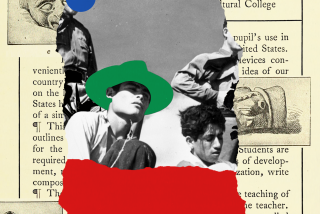National History Standards
- Share via
As a secondary school history teacher for 38 years and the author of more than 30 history books for high school and middle school students, I heartily commend your editorial praising the new national standards for United States history (Oct. 27).
Instead of perpetuating the boring practice of asking students to regurgitate isolated names, events, and dates, the new standards challenge youngsters to apply historical evidence and critical thinking to understanding what has happened in the past and what is happening today. These standards are rigorous and demanding; students first must acquire a broad base of related information before they can meaningfully investigate major historical themes, trends and problems.
The political tone of the standards is moderate, as might be expected since their validation was the product of a consensus reached by hundreds of historians and secondary school teachers--both Republicans and Democrats.
One great strength of the standards is their inclusive approach to our history. The roles played by women and minorities are at long last properly recognized as significant factors in weaving the multifaceted fabric that we call the American experience.
EDMUND LINDOP
Pacific Palisades
* I strongly disagree with your editorial. As a high school student 10 years ago, I learned about Harriet Tubman and Robert E. Lee. However, the recommended standards mention Tubman several times without mentioning Lee once. How can any truly serious history of our nation possibly gloss over the name of a man whose tormented soul gives such insight into the secession of the South and the bloodiest war in our history?
I also remember learning about the plight of black slaves, women and their fight for suffrage, and the brutal treatment of Native Americans. Additionally, I learned about the hundreds of thousands of white and black male Union soldiers who died on American battlefields, at least in part so that black slaves would be freed. Were these Americans not all “common,” and the very people your editorial suggests were excluded from history books until now?
History is a time line of recorded events in which human beings interacted; we study it so that we might learn more about the human experience. It is true that American history has been disproportionately guided by white males. But is this a reason to rewrite lopsided history books which teach kids about the bravery of Tubman, but de-emphasize great (white) men like Ulysses S. Grant and Thomas Edison, and overplay the role of the KKK and McCarthyism?
Lynne Cheney, former head of the National Endowment for the Humanities, and Rush Limbaugh are right: These “standards” should be “flushed down the toilet.”
MARK E. PATERSON
Malibu
More to Read
Sign up for our Book Club newsletter
Get the latest news, events and more from the Los Angeles Times Book Club, and help us get L.A. reading and talking.
You may occasionally receive promotional content from the Los Angeles Times.










